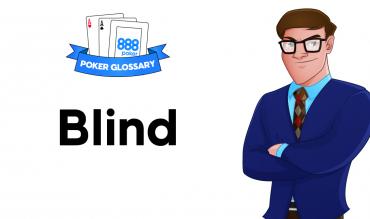Explanation of Blind
The mandatory payments preflop are referred to as “blinds” because the small-blind and big-blind positions don’t get to check their hole-cards before deciding whether to invest in the pot.
Being forced to invest chips into the pot while blind is a huge disadvantage in general. It’s virtually impossible to generate a positive winrate out of the blinds. It’s the blinds that generate action at the table however. Players are incentivized to play non-premium holdings preflop in the hope of being able to win the blinds outright.
Both the small-blind and big-blind positions invest blind payments preflop. The big-blind payment is typically twice the size of the small-blind payment, although not always. A common structure used in casinos is $2/$5. (The small-blind payment is $2, while the big-blind payment is $5). We can see clearly in this example that the big-blind payment is over twice the size of the small-blind payment.
How to Use Blind as Part of Your Poker Strategy
Despite the disadvantageous nature of making blind bets, players opt to make such bets out of choice.
For example, straddling in poker is a type of blind bet which is frequently used in live casinos. Mathematically, straddling is extremely unlikely to generate a positive expectation, since it involves investing money into the pot without knowing our hand strength. Players make use of such plays hoping to generate action and get their opponents playing looser. Realistically, it’s highly unlikely any benefits from straddling will outweigh the huge drawbacks of being forced to invest while blind.
Blind bets can also occur on the postflop betting rounds. Even in televised poker amongst professionals, we see players occasionally making use of the “dark-bet”. This is essentially a postflop bet made before seeing which community card/s are dealt. For example, an out-of-position player might call a 3bet preflop and then announce his intention to “bet in the dark” before the dealer has dealt the flop. His postflop bet will then stand, regardless of which flop texture is dealt.
This confers no mathematical advantage (rather a disadvantage), but such plays are presumably made for psychological reasons. I.e an attempt to make the villain in the hand feel uncomfortable. Similar to straddling, it’s highly unlikely that any benefits gained from dark-bets will outweigh the huge drawbacks.
See Also
Straddle, Three-bet, Flop, Small-blind, Big-Blind, Big-bet, Actions


